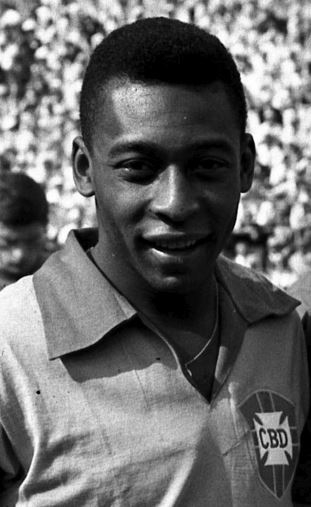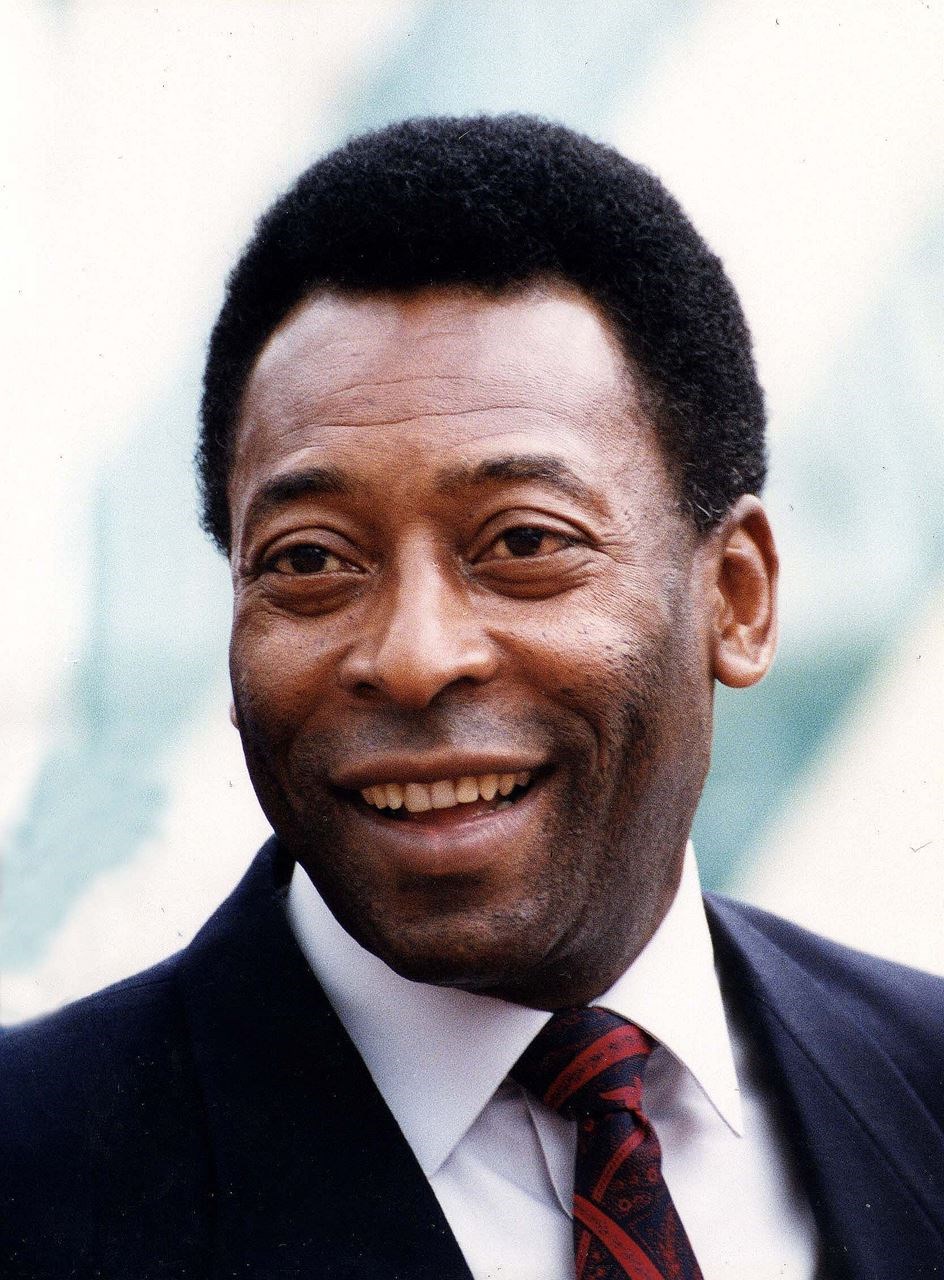”Pelé is a nickname that Edson Arantes do Nascimento acquired long before he became one of the world's most famous and beloved soccer players.” (Contemporary Authors Online ). Pelé was born on October 23, 1940 in a small town in Brazil called Tres Coracoes. The love for soccer ran through his blood, as his father was also a professional soccer player (Pelé (Biography Today).His family and the rest of the town he lived in was poor. So instead of playing with a soccer ball and a pair of shoes, Pelé’s father filled a sock up with rags, and Pelé ran barefoot kicking the filled up sock through Tres Coracoes (Notable Sports Figures). Pelé then caught the eye of Waldemar de Brito with his soccer skills, who took him to the city of Santos where his first professional trial would be held (Contemporary Black Biography). Pelé became popular in Brazil and the rest of the world after leading Brazil to their first in many World Cup Championships. After winning two World Cup Championships after his first, Pelé soon decided to retire as a sports commentator in the U.S. (Contemporary Black Biography). His goal was to spread his love of soccer to countries where the love of the sport was underdeveloped (Contemporary Black Biography). To be identified as a hero, a person must possess the persistence to not let anything get in the way of what they want to be or love to do, and to have the selflessness to not just think of yourself, but to help others in need. Throughout Pelé’s life, he has proved to the world that he is a hero because of his persistence and selflessness, which lead him to win Brazil's first three World Cups and spread his love of soccer throughout the U.S.
 https://commons.wikimedia.org/Photo by UnknownCropped by Bluemel1 [Public domain]Pelé’s persistence led him to be known as the best soccer player who has ever lived. He didn't let anyone hold him back, even when he was being violently targeted during his games. ”In England, a series of brutal attacks by opposing defenders again forced him to the sidelines with leg injuries, and Brazil was bounced from the World Cup after one round” (Biography.com Editors). Pelé’s gift soon became a curse as defenders from the opposing team started targeting him and injuring him severely every chance they got. These violent acts on the field did not only hurt Pelé’s physical state, but also his mental state. “In this mood I sometimes feel like giving up football altogether, but I carry on because those few precious moments of pleasure from football mean more to me than anything else" (UXL Biographies). Pelé was hurt but refused to give up on his country and his fans. He didn't let the rough hits to his body overcome how he felt. Those precious moments of pleasure he got from playing soccer were too strong. One of Pelé’s many obstacles in his way was his financial support. ”His parents couldn't afford to buy Edson a soccer ball, so his father took an old sock and stuffed it with rags, and the child would run shoeless through the streets and kick the sock” (Notable Sports Figures). Most people who don't have financial support and live in poverty don't make it in the world. Even without the financial support and the right equipment, Pelé still persisted to work with what he had and become an amazing soccer player. Pelé’s persistence helped him through the obstacles he had faced throughout his life, which lead him to become hero in many people's eyes.
https://commons.wikimedia.org/Photo by UnknownCropped by Bluemel1 [Public domain]Pelé’s persistence led him to be known as the best soccer player who has ever lived. He didn't let anyone hold him back, even when he was being violently targeted during his games. ”In England, a series of brutal attacks by opposing defenders again forced him to the sidelines with leg injuries, and Brazil was bounced from the World Cup after one round” (Biography.com Editors). Pelé’s gift soon became a curse as defenders from the opposing team started targeting him and injuring him severely every chance they got. These violent acts on the field did not only hurt Pelé’s physical state, but also his mental state. “In this mood I sometimes feel like giving up football altogether, but I carry on because those few precious moments of pleasure from football mean more to me than anything else" (UXL Biographies). Pelé was hurt but refused to give up on his country and his fans. He didn't let the rough hits to his body overcome how he felt. Those precious moments of pleasure he got from playing soccer were too strong. One of Pelé’s many obstacles in his way was his financial support. ”His parents couldn't afford to buy Edson a soccer ball, so his father took an old sock and stuffed it with rags, and the child would run shoeless through the streets and kick the sock” (Notable Sports Figures). Most people who don't have financial support and live in poverty don't make it in the world. Even without the financial support and the right equipment, Pelé still persisted to work with what he had and become an amazing soccer player. Pelé’s persistence helped him through the obstacles he had faced throughout his life, which lead him to become hero in many people's eyes.
 https://commons.wikimedia.org/John Mathew Smith & www.celebrity-photos.com from Laurel Maryland, USA [CC BY-SA 2.0 (https://creativecommons.org/licenses/by-sa/2.0)]It’s one thing to be known as the best soccer player in the world, and another to also be known as selfless enough to help others. Pelé did both. "'It is a mission,' Pelé told E.M. Swift in Sports Illustrated. 'To bring soccer to the countries where [the sport] is undeveloped, this is my passion. I want to see soccer all over the world'” (Contemporary Black Biography). His selflessness went a really long way after his retirement. Pelé didn't stop at bringing the joy of soccer to his country, but to all the other countries where soccer was underdeveloped. He wanted to spread his love of the sport to countries that lacked the development of the sport. Pelé earned many awards to prove how selfless he was. The award that stands out in his life is the International Peace Award. “In 1978, Pelé was awarded the International Peace Award for his work with UNICEF. He has also served as Brazil's Extraordinary Minister for Sport and a United Nations ambassador for ecology and the environment" (Biography.com Editors). Unicef is mandated to protect children's rights. Pelé worked with them, and then in reward received the International Peace Award. Only a true selfless hero would be granted an award like this. Throughout Pelé’s retirement, he didn't just use his money to please himself, but also to help others and give back to the community.
https://commons.wikimedia.org/John Mathew Smith & www.celebrity-photos.com from Laurel Maryland, USA [CC BY-SA 2.0 (https://creativecommons.org/licenses/by-sa/2.0)]It’s one thing to be known as the best soccer player in the world, and another to also be known as selfless enough to help others. Pelé did both. "'It is a mission,' Pelé told E.M. Swift in Sports Illustrated. 'To bring soccer to the countries where [the sport] is undeveloped, this is my passion. I want to see soccer all over the world'” (Contemporary Black Biography). His selflessness went a really long way after his retirement. Pelé didn't stop at bringing the joy of soccer to his country, but to all the other countries where soccer was underdeveloped. He wanted to spread his love of the sport to countries that lacked the development of the sport. Pelé earned many awards to prove how selfless he was. The award that stands out in his life is the International Peace Award. “In 1978, Pelé was awarded the International Peace Award for his work with UNICEF. He has also served as Brazil's Extraordinary Minister for Sport and a United Nations ambassador for ecology and the environment" (Biography.com Editors). Unicef is mandated to protect children's rights. Pelé worked with them, and then in reward received the International Peace Award. Only a true selfless hero would be granted an award like this. Throughout Pelé’s retirement, he didn't just use his money to please himself, but also to help others and give back to the community.
Pelé, is a hero because of his heroic acts of persistence and selflessness he accomplished throughout his soccer career and his retirement. Pelé’s persistence pushed him through his cuts and bruises he received from the the other players on the field and the lack of equipment when he was young. Me and many others aspire to be as persistent and selfless as him. Edson Arantes do Nascimento is a hero to all athletes, especially those who are faced with many obstacles.
Works Cited:
Biography.com Editors. “Pelé.” Biography.com, A&E Networks Television, 15 Apr. 2019,
www.biography.com/athlete/pele. Parenthetical
"Pele." Contemporary Authors Online, Gale, 2015. Biography In Context,
https://link.galegroup.com/apps/doc/H1000311052/BIC?u=powa9245&sid=BIC&xid=32e27441. Accessed 29 Apr. 2019.
"Pelé." Contemporary Black Biography, vol. 7, Gale, 1994. Biography In Context, https://link.galegroup.com/apps/doc/K1606000893/BIC?u=powa9245&sid=BIC&xid=d31f3f66. Accessed 29 Apr. 2019.
"Pelé." Notable Sports Figures, edited by Dana R. Barnes, Gale, 2004. Biography In Context,
https://link.galegroup.com/apps/doc/K2440301401/BIC?u=powa9245&sid=BIC&xid=17a40d5c. Accessed 1 May 2019.
“Pelé.” Pelé (Biography Today), Jan. 2010, p. 1. EBSCOhost,
search.ebscohost.com/login.aspx?direct=true&db=b6h&AN=34912835&site=brc-live. Vancouver/ICMJE
"Pelé." UXL Biographies, UXL, 2011. Student Resources In Context,
https://link.galegroup.com/apps/doc/EJ2108101793/SUIC?u=powa9245&sid=SUIC&xid=8485f322. Accessed 1 May 2019.
Page created on 5/10/2019 8:39:30 PM
Last edited 5/15/2019 4:15:49 AM
